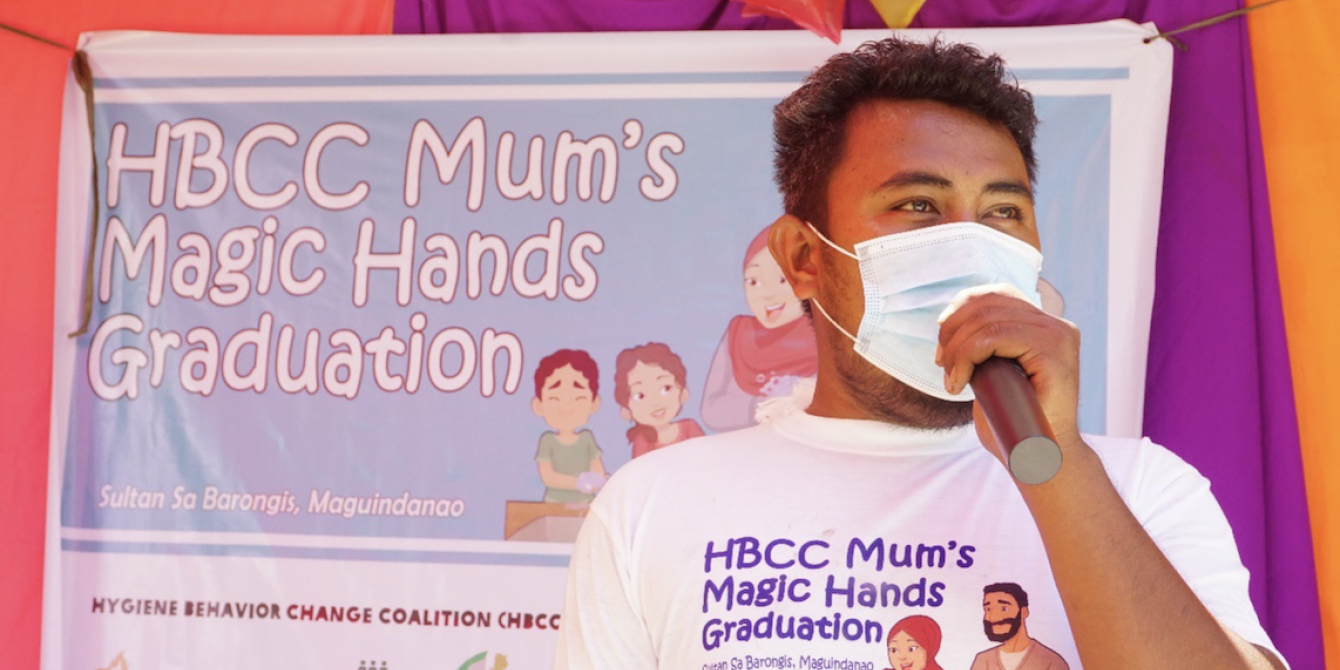Towards a clean and COVID-19 resilient community

Morodin discusses the importance of frequent and proper handwashing in front of community members during the Mum's Magic Hands Graduation at Sultan sa Barongis, Maguindanao. The 'graduates' are expected to become health champions within their communities and ensure the project's sustainability. (Photo: IDEALS)
Morodin Mangintas Mohammad, 26, is the secretary of Tugal village, Sultan sa Barongis, Maguindanao, a village of approximately 732 people. As a village secretary, Morodin keeps the records of their village, its population, including live births and mortality data.
When the COVID-19 pandemic hit in early 2020, Morodin felt the fear of the residents in their community. The virus being novel, there was no other directive but to wear masks, observe social distancing, and practice frequent handwashing.
As scientists scrambled to look for a cure and create a vaccine against the virus, water, sanitation, and hygiene (WASH) became the primary antidote.
During the height of the pandemic, Oxfam together with its local partners, with support from Unilever and the United Kingdom Department for International Development, implemented the Hygiene Behavior Change Coalition (HBCC) Project for COVID-19 in the Philippines in Maguindanao.
Under this project, the residents from Sultan sa Barongis, Maguindanao participated in the Hygiene Promotion Sessions of the Mum’s Magic Hands (MMH) Program and COVID-19 management training. Morodin, along with other health champions, learned the importance of frequent handwashing with soap especially during health emergencies in order to prevent the spread of diseases.
As Morodin and the rest of the community members gained knowledge on WASH, the fear of COVID-19 significantly decreased and good hygiene behavior steadily became the norm.
Maintaining cleanliness in the home and in the communities has traditionally been assigned as women's task, especially mothers and wives, but Morodin has learned otherwise through the project.
“All of the health champions in our team are men. When we started, the men realized that cleanliness is not just the obligation of women but of men as well,” he said.
As a husband and a father, Morodin applied his learning to his own family.
“I already know what to do before, I just did not do it. When we had the hygiene promotion sessions, I was already the one cleaning the house, doing the laundry, sweeping the floor, taking care of the child, changing the child’s diapers. That’s how I implemented my learning,” he shared.
For Morodin, if not for the project, things would have been very different.
Farming and fishing, the primary source of income for the residents in Tugal village, were adversely affected by the pandemic. This made it difficult for some of the community members to put food on their table. In their village, the suffering of one is the suffering of all. That is why unity is key.
“We have an advocacy in our village that we should help each other because if someone suffers especially in the midst of this pandemic, everybody else suffers too,” Morodin explained.
Even though the project has already been concluded, Morodin and his fellow health champions continue to pass down their knowledge to the other members of the community.
Every Friday, the village chairperson speaks to the community to encourage everyone to contribute in preventing the transmission of COVID-19.
Asked to give a message to the members of his community, Morodin said, “In health matters, everyone is expected to contribute. We should continue what we have learned in order to prevent COVID-19 transmissions in our community.”

 Follow us on Facebook
Follow us on Facebook Instagram
Instagram Follow us on Twitter
Follow us on Twitter LinkedIn
LinkedIn